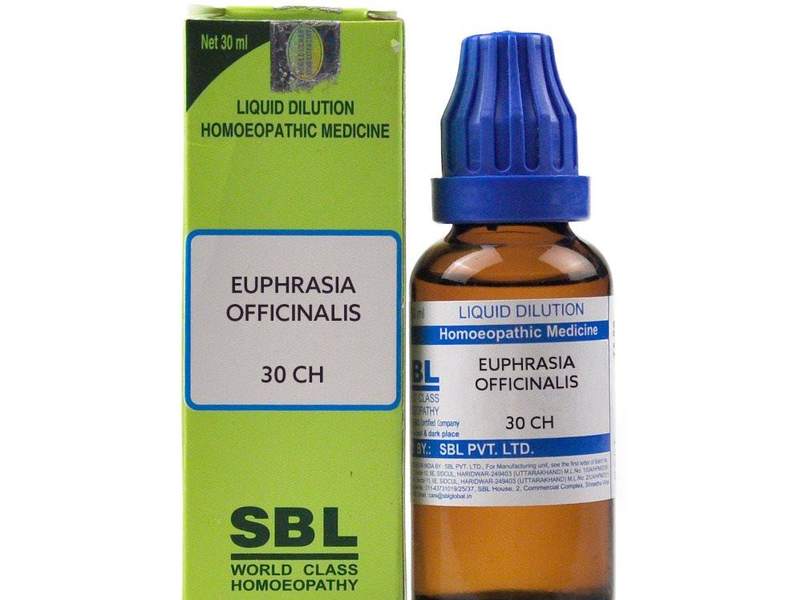- Profuse acrid lachrymation with profuse bland coryza
- Cough only during daytime
- Menstrual flow lasts only one day or sometimes only one hour
Source: Vegetable kingdom
Synonyms: Eyebright
Family: Scrophulariaceae
Prover: Dr Hahnemann in 1819
Duration of Action: Upto 7 days
Miasmatic Background: Psora
Temperament: Irritable
Diathesis: Scrofulous
Thermal Relationship: Chilly patient
Introduction and History: It is a very useful medicine in eye complaints. The name Eyebright is very significant. According to Grauvogl, the doctrine of signature is, ‘a black spot in the corolla of a flower which looks like the pupil.’ It is well known that Euphrasia is an eye medicine known to the ancient people as a remedy for the eyes. It was known as early as the fourteenth century. The name Euphrasia is taken from ‘euphrasine’, a way of expressing joy or pleasure.
Habit and Habitat: It is indiginous of United States and Europe. It grows in barren, sunny spots. It is an annual plant; lower leaves are crenate and the floral leaves are briskly toothed. Flowers are small, solitary, white yellowish-bluish in colour.
Preparation and Parts Used: The mother tincture is prepared from the whole plant without the roots during flowering time.
Constitution and Physiognomy: It is adapted to people having bad effects of falls, contusions or mechanical injuries to external parts.
Ailments From: Bad effects from falls, contusions, mechanical injuries.
Seat of Action (Pharmacodynamics): Mucous membrane of eyes, nose, chest, lids, respiratory tract, throat, etc.
Active Principles (Chemical Constituents): It contains tannic acid, a volatile, acrid, bitter principle which has not yet been named.
Doctrine of Signature: As pointed out by Grauvogl, there is ‘a black spot in the corolla of the flower which makes it look like the pupil’ ear-marking it for eye affection. It’s range of action in diseases of the eyes is surprisingly sweeping.
Physio-pathological Changes (Pathology)
- Through the ganglionic nervous system it affects the mucous membrane of the eyelids producing a distinct catarrhal inflammation and is characterised by an excessive watery secretion which is nothing but profuse, acrid lachrymation.
- It acts on the mucous membrane of the respiratory tract, producing a distinct catarrhal inflammation and is characterised by an excessive secretion.
Characteristic Mental Symptoms (Psychology)
- Confusion of the head, weakness of memory.
- Hypochondriacal mood, takes interest in surrounding objects.
- Vertigo with heaviness of the head with a tendency to fall.
- Taciturnity and repugnance to conversation.
Characteristic Physical Guiding Symptoms
Coryza: Profuse, acrid and excoriating lachrymation, with profuse, bland
coryza.
Alternations: Cough alternates with piles; colic alternates with affections of the eyes.
Drowsiness: Great drowsiness during daytime. Chilly patient, cannot get warm in bed.
Yawning: Frequent yawning when walking in open air.
Whooping cough: Excessive lachrymation during whooping cough. Cough only during daytime.
Amenorrhoea: Amenorrhoea with catarrhal symptoms of eyes and nose; profuse acrid lachrymation.
Menses: Menses painful, regular or late, scanty, short, lasting only one day, but now lasting only one hour.
Expectoration: Profuse, offensive expectoration of mucous by voluntary hawking; aggravated, on rising in the morning.
Eyes: Eyes water all the time and are agglutinated in the morning. Catarrhal conjunctivitis, margins of lids red, Swollen and burning.
Urine: Prostatitis, nocturnal irritability of urinary bladder; dribbling of urine.
Important Characteristic Features
Cough and coryza: Profuse acrid lacrymation with profuse bland coryza. Eyes water all the time; tears are copious and acrid; great sneezing and profuse coryza. Nasal mucous membrane is swollen and the discharge is bland. After one or two days, coryza extends into the larynx with a hard cough and much offensive expectoration. Sensation of dryness, burning and biting in the eyes. Margins of the eyelids red, swollen and burning. Violent itching of eyes. Puffiness of lids and blurred vision. Cough only in the daytime; tickling sensation in the larynx. Terrible irritation in the larynx compelling the patient to cough followed by pressure beneath the sternum, better by lying down.
Eye affections: Eyes water all the time which is copious and acrid. Eyes are agglutinated in the morning. Profuse, acrid lachrymation with profuse bland coryza (reverse – All-c, where coryza is acrid and lachrymation is bland). Sensation of dryness, burning and biting in the eyes. Cutting pain in eyes extending to head; pressure in eyes as if caused by sand. Margins of lids red, swollen and burning, very sensitive to touch. There is violent itching of eyes leading to rubbing and winking. There may also be fine rashes about the eyes with puffiness of lids and blurred vision.
General Modalities
Aggravation: In the morning, in bed, from warmth, moisture, indoors, after exposure to south winds, when touched, in the evening.
Amelioration: At night, by lying down, from coffee, in dark.
Remedy Relationships
Follows well: Acon, Alum, Calc, Con, Lyc, Merc, Nux-v, Phos, Rhus-t, Sil.
Antidotes: Camph, Caust, Puls.
Comparison
Cough only in daytime: Euphr, Ferr.
Bland coryza: Calc, Euphr, Puls.
Conjunctivitis from injuries: Arn, Euphr, Symph.
Potency: 3x, 6x, 12x, 30, 200, 1000.
Dosage: Third to sixth potency. Euphrasia lotion for eye troubles.
Repetition: Bears repetition very well.
Therapeutic Value: Amenorrhoea, Blepharitis, Cataract, Cold, Conjunctivitis, Coryza, Cough, Eye affections, Fevers, Influenza, Lachrymation, Measles, Menstrual troubles, Nose affections, Paralysis, Prostatitis, Sneezing.
Ask A Doctor
You can now consult our well qualified homeopathic doctor for homeopathic treatment of any kind of disease. The consultancy fee is only Rs 200/- . Post making the payment you will be asked about the disease and the symptoms of your disease. Based on your problem, the doctor will instruct you with the name of the medicine and the method of having the medicine. You can make the payment via Paytm App or your debit card. For more inquiry contact on the WhatsApp number - +919006242658


Comments are closed, but trackbacks and pingbacks are open.